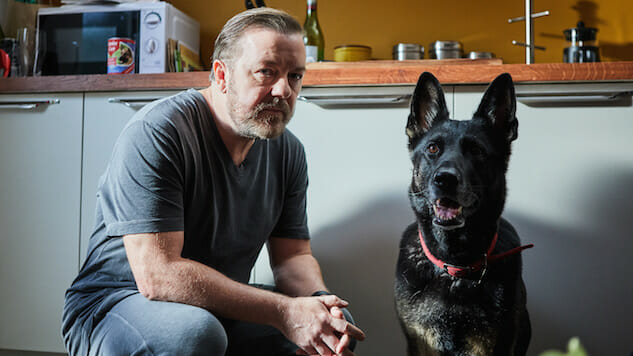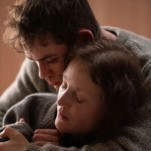How After Life and Russian Doll Build Their Microcosms of Grief
Photo: Natalie Seery/Netflix
Somewhere around the middle of After Life, probably during one of the cemetery chats between Ricky Gervais and goddess of groundedness Penelope Wilton, I started asking myself if I was a terrible person. I wasn’t sure “no” was a solid answer. In Gervais’ protagonist, Tony, I kind of recognized myself—no, that’s not exactly right. I recognized myself in the way peripheral characters react to him. His boss, who is also his brother-in-law, is exhausted from trying to convince him not to kill himself, and he’s starting to bristle at Tony’s cluelessness in thinking he’s the only one in pain. The local junkie is offended because Tony keeps trying to say they’re basically in the same situation. His new co-worker either looks horrified or weeps every time he opens his mouth. The lady at the cemetery is quietly bemused at this kind of epic self-centeredness in a grown-ass man. The only person who seems enthusiastic about Tony’s cutting, acerbic, obnoxious personality is his wife, who tells him how decent and lovely he is in videos recorded from her hospital bed before she died of breast cancer. The setup of the series is that his wife’s death has pushed Tony into a morass of psychic pain from which he lashes out at everyone, saying all the Gervais-nasty things he… what? Thought before but kept to himself? Except we kind of get the sense he never especially hid his disdain and contempt and ire in the first place. In the video footage of Tony and his wife, which he replays obsessively on his laptop, he’s usually dousing her with literal cold water or blasting her out of sound sleep with an air horn. It seems like in Gervais’ mind, or at least in the mind of this script, true love equals having a partner who truly does find your most annoying impulses endearing. I’d be quick to concede that’s a big thing to lose.
Loss and pain make some people more expansive, more forgiving. Maybe that’s what grief is supposed to do, or what it should do, but it doesn’t go that way for everyone. Some people fall victim to the pernicious, persistent illusion that they are in more pain than anyone else could understand, or that they have somehow been singled out to suffer. Anger burns itself out, generally speaking. So does terror. Grief, though—grief is the ultimate renewable resource. It is nearly infinite, it is self-sustaining, it is an entire ecosystem. People can get lost in it forever. Well-meaning friends and colleagues and family members will try to pull you out, but pain is a psychic quicksand that simply swallows you faster if you struggle against it. If the well-meaning friends don’t understand that intimately, they will not only push you down farther, but they’ll ultimately get really pissed off at you for not rising above it. After a while, you don’t even believe in the idea of rising above it, because as far as you can tell there is no “above it.” It surrounds you like an atmosphere. Not unlike the empty snow globe on the desk of Tony’s super-banal colleague. “Well,” she notes when he notices it, “it’s the kind where you’re meant to put in a photo of a loved one. But I haven’t met anyone yet.”
After Life isn’t a perfect show, by any means. It’s often a bit facile or unearned, and it is sometimes heavy or mawkish or obvious. But it’s compelling. Gervais has a kind of pathetic honesty about his own worst qualities that is, at its best, pretty brilliant. I don’t know if I’m alone in my urge to compare After Life to Russian Doll or if the comparison is even fair—the objectives of the two series are different—but they do handle some oddly overlapping ideation about loss and sorrow and having nothing to lose and the redemptive value of connection. If you look at them side by side, Russian Doll distinguishes itself as tighter, deeper and more stylish in most ways. Yet in each, a fundamentally self-centered protagonist, crippled by psychic pain and stuck in an unlivable situation, is slowly jarred into attempting to reclaim his or her humanity. Both Tony and Natasha Lyonne’s Nadia Vulvokov are intelligent (to their own detriment), acidly witty, observant, able to discern patterns. Both have nihilistic, self-medicating, self-destructive impulses they don’t bother to check. Both are dismissive and ridiculing toward those who care for them, though you can tell they do value their friends, deep down. Both are isolated and lonely even though there are well-realized and interesting peripheral characters in abundance. And in both cases, the meditation on the psychological mousetrap of unresolvable grief emerges as the core story. Grief becomes its own paradigm, a little inescapable microcosm that blinds people to everything but itself. Once you’re blind to everything except grief, of course you cannot get out of it; there is no “out of it” except death—or, as Russian Doll argues, perhaps not even death.
-

-

-

-

-

-

-

-

-

-

-

-

-

-

-

-

-

-

-

-

-

-

-

-

-

-

-

-

-

-

-

-

-

-

-

-

-

-

-

-








































